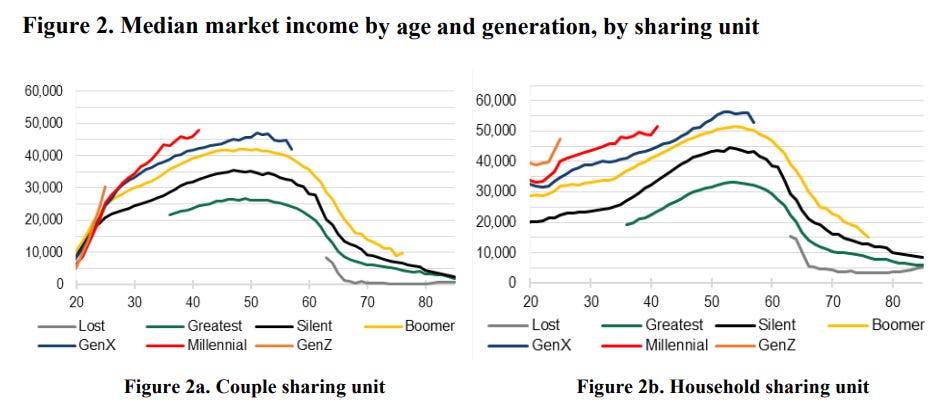Links 2024-02-15 - Four CCW For Less Worry
CCW is short for Counter Conventional Wisdom
Each of these four links shows us that we are worrying about the wrong things.
First, Jeremy Horpedahl shares evidence that Younger Generations Have Higher Incomes Too. The “too” is because this is a follow-on to his recent work showing that younger generations are keeping up with the wealth track of earlier generations. His short piece is a nice summary of a recent paper by the Kevin Corinth and Jeff Larrimore published by the Federal Reserve.
A key graph from the paper that encapsulates their findings:
Second, Matt Yglesias gives a frank breakdown on why “Dentists are Bad”. It is a brief look at the larger evidence that a lot of dentistry is not based on rigorous scientific study and that the industry is rife with bad incentives.
While he is arguing that we need to question dentistry, there is an optimism inherent in the piece: 1) it is evidence of a growing desire to question conventional wisdom, and 2) as he says in the conclusion, it is “a good example of how it’s not true that we face a routine tradeoff between efficiency and equality — the more efficient approach here is also more egalitarian.”
Third, Dr. Jeffrey Singer speculates about the phenomenon he terms nicotinophobia—”an unfounded and irrational fear of nicotine”. He points out in this post how people have a mistaken conventional belief that nicotine is much more dangerous than it actually is. In fact, it is relatively harmless by itself with many direct benefits and beneficial side effects.
Fourth, climate scientist Roger Pielke offer ample evidence that we can relax about the trend for the occurrence and destruction caused by tropical cyclones. A key paragraph:
“In technical terms, detection of change has not been achieved — which is fully consistent with the scientific consensus of NOAA and the IPCC. Without detection there can be no attribution under the IPCC framework for detection and attribution. Given the large interannual and decadal variability in tropical cyclones, data are easily cherrypicked (intentionally or unintentionally) to identify spurious trends.”


